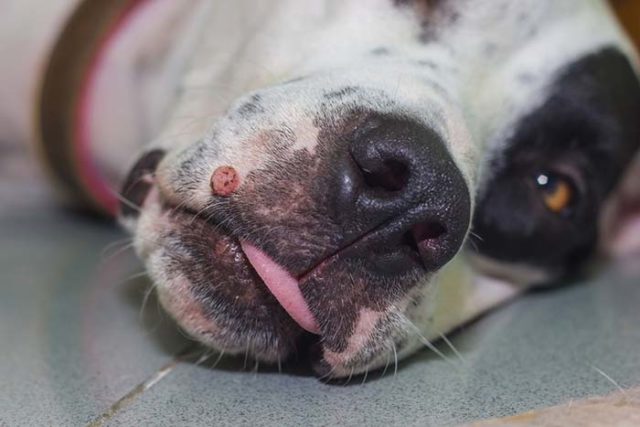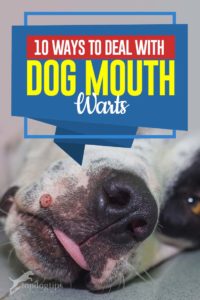
Table of Contents
The first step that any pet owner should take if they suspect that their dog has mouth warts is to take them to the vet and make sure that those are indeed dog mouth warts and not something potentially more dangerous. A mouth wart is considered a medical condition, which is also known as canine papillomatosis, and may require specific treatment in more severe cases.
It is often the case that dog mouth warts will go away on their own over time, yet it's still best to have the condition confirmed by a veterinarian, even if no treatment is necessary. However, if your vet has recommended that you try any one of the known remedies that have been shown to help clear up dog mouth warts, and you would like to know more about your options, here are some tips to consider.
At-home Dog Mouth Warts Treatment
1. Wait to See What Happens
Time is the best healer of mouth warts in dogs. Commonly, they will clear up on their own without medical intervention. However, depending on your pet's case and their immune system, this process may take as long as 1 to 5 months, especially in puppies who are just starting to develop their immune systems. For more information about this option, please read the following article on oral papillomas from the Canadian Animal Medical Hospital website.
2. Boost Your Dog’s Immune System
There are several ways that dog owners can boost their pet’s immune system to encourage it to better fight off the mouth warts. A number of companies make pet-safe vitamin blends that can be purchased online or at a pet store and given to your dog orally.
However, because most dogs get their daily requirements of vitamins and minerals from their commercial dog food formulas, you want to make sure you don’t give them too much of anything. Consult your vet to help determine if adding additional supplements to your dog’s diet is recommended, which is especially important for home-cooked recipes.
3. Vitamin E
Dog owners can purchase a bottle of vitamin E capsules for dogs, then puncture a capsule and rub the contents of it directly on the dog’s mouth warts twice a day. This method can be used daily for two to three weeks and has been shown to help warts shrink and heal.
4. Castor Oil
Castor oil is another treatment option that works in the same ways that vitamin E does. When either of these two substances is applied directly to the dog’s papillomas, the warts should shrink and hopefully disappear within two to three weeks of twice-daily application. These methods are also reported to help with the irritation that dogs might feel due to having warts in their mouth.
5. Thuja
Thuja is a natural immune booster that has shown promise for treating canine papillomatosis. It comes in the form of drops or pellets. Depending on what product you buy, the Thuja product may be applied topically to the warts or given orally to your dog. A very popular thuja dog wart remover is Boiron Occidentalis 30C, a homeopathic medicine with a proven track record in people and pets.
Other at-home dog wart removers to consider are:
| Preview | Product | Rating | |
|---|---|---|---|

|
Dog Wart Remover (30ml) 100% Natural Painless Dog... | 957 Reviews | Check Price |

|
Naturasil All-Natural Dog Warts Remover Pure Thuja... | 2,809 Reviews | Check Price |

|
Boiron Thuja Occidentalis 30C 80 Pellets Wart... | 1,132 Reviews | Check Price |
Veterinarian's Dog Mouth Warts Treatment
6. Crushing Papillomas
Some vets will decide to use a safe and sanitary method of crushing the warts that are located in the dog’s mouth in order to naturally encourage the dog’s immune system to fight off the papillomas on their own. Licensed veterinarian Wendy Brooks explains this method in her article entitled Viral Papillomas.
Given orally to dogs with mouth warts, this antiviral medication that is often used to treat cancer and viral infections such as hepatitis b and hepatitis c in humans stimulates the immune system and has been shown to help clear up canine oral papillomavirus. Further information about the use of Interferon to treat dog mouth warts can be found on the Animal Medical Hospital website, in the following article.
When given to dogs intravenously, scientific research has shown that this is a very quick and effective method of eliminating dog mouth warts, as was demonstrated by the scientific study that is described in the following article, Oral Papillomatosis in a Dog and its Therapy with Taurolidine (PDF).
9. Azithromycin Antibiotic
Less commonly, dog mouth warts can become infected. If they do, an antibiotic may be needed to clear up the infection. Scientific researchers conducted a study regarding the effectiveness of this treatment in clearing up dog mouth warts and reported that Azithromycin is, in fact, a safe and effective treatment for canine papillomatosis, as stated in this peer-reviewed article.
10. Surgical Removal or Freezing
In the rare case that a dog develops so many mouth warts that he or she is unable to eat, or if the dog’s warts become excessively inflamed, infected, or do not go away on their own or with the use of the other options, having a veterinarian surgically remove or freeze off the warts might be a good option.
However, the surgical removal of mouth warts in dogs has been shown to exacerbate canine papillomatosis, as was revealed in a scientific study conducted by Phillip K. Nicholls’ and his colleagues.’ Further details can be found in this article.
How to Prevent Dog Mouth Warts
 To help prevent your dog from developing mouthwarts, it is recommended that pet owners never over-vaccinate dogs, as vaccinations have been associated with the development of canine papillomatosis. Avoid places where infected dogs may hang around, too. For example, only use reputable dog parks and dog boarding facilities, as these places can be cause of infection.
To help prevent your dog from developing mouthwarts, it is recommended that pet owners never over-vaccinate dogs, as vaccinations have been associated with the development of canine papillomatosis. Avoid places where infected dogs may hang around, too. For example, only use reputable dog parks and dog boarding facilities, as these places can be cause of infection.
Also, feed dogs a healthy and well-balanced diet with all of the necessary vitamins and minerals to keep their immune system in top shape. Dog mouth warts are often a sign that the dog's body cannot fight off the infection on its own, which is a sign that some other health issues may be interfering, too. Make sure dogs always have access to clean drinking water and keep toys, bowls, and bedding clean.
READ NEXT: 3 Ways to Prevent and Treat Staph Infection in Dogs
Disclosure: We may earn affiliate commissions at no cost to you from the links on this page. This did not affect our assessment of products. Read more here and find full disclosure here.












